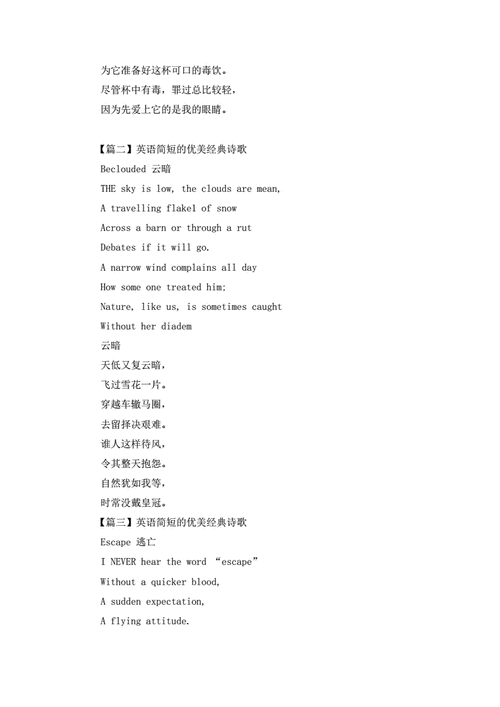快字结尾的七言诗
Exploring the Beauty of English Poetry: An Analysis of Exquisite Sentences
```html
Exploring the Beauty of English Poetry: An Analysis of Exquisite Sentences
Poetry, with its vivid imagery, evocative language, and profound emotions, has the power to captivate hearts and minds. Within the realm of English poetry, there are sentences that sparkle like gems, each carrying its own unique charm and meaning. Let us delve into the enchanting world of these poetic sentences, appreciating their beauty and unraveling their depths.
1. "Shall I compare thee to a summer's day? Thou art more lovely and more temperate." William Shakespeare, Sonnet 18
Shakespeare's timeless words in Sonnet 18 resonate with readers across centuries. The comparison of the beloved to a summer's day, albeit beautiful, highlights the transient nature of seasonal beauty. Yet, the beloved is deemed "more lovely and more temperate," suggesting an eternal quality that transcends the fleeting beauty of nature.
2. "The woods are lovely, dark and deep, But I have promises to keep, And miles to go before I sleep, And miles to go before I sleep." Robert Frost, Stopping by Woods on a Snowy Evening
Robert Frost's stanza from "Stopping by Woods on a Snowy Evening" paints a serene yet hauntingly introspective scene. The repetition of "And miles to go before I sleep" emphasizes the speaker's sense of duty and obligation amidst the tranquil beauty of nature. It speaks to the human experience of responsibilities overshadowing moments of tranquility.
3. "Do not go gentle into that good night, Old age should burn and rave at close of day; Rage, rage against the dying of the light." Dylan Thomas, Do not go gentle into that good night
Dylan Thomas's powerful lines in "Do not go gentle into that good night" convey a sense of defiance in the face of mortality. The imperative "Do not go gentle" urges resistance against the inevitability of death, urging individuals to live passionately and fiercely until the very end.
4. "I wandered lonely as a cloud That floats on high o'er vales and hills." William Wordsworth, I Wandered Lonely as a Cloud
William Wordsworth's imagery in "I Wandered Lonely as a Cloud" transports readers to the ethereal realm of nature. The simile comparing the speaker to a cloud evokes a sense of solitude and detachment, yet the subsequent description of the cloud "floating on high o'er vales and hills" captures a feeling of sublime freedom and interconnectedness with the natural world.
5. "Two roads diverged in a wood, and I— I took the one less traveled by, And that has made all the difference." Robert Frost, The Road Not Taken
In "The Road Not Taken," Robert Frost contemplates the significance of choices and the paths we take in life. The metaphor of the diverging roads symbolizes life's decisions, with the speaker opting for the less conventional path. This choice, though seemingly insignificant at the time, proves to be transformative, emphasizing the importance of individual agency and forging one's own journey.
English poetry, with its richness of language and depth of meaning, continues to inspire and resonate with readers worldwide. Each of these sentences encapsulates the essence of poetic expression, inviting readers to contemplate life's complexities and appreciate the beauty found within the written word.

